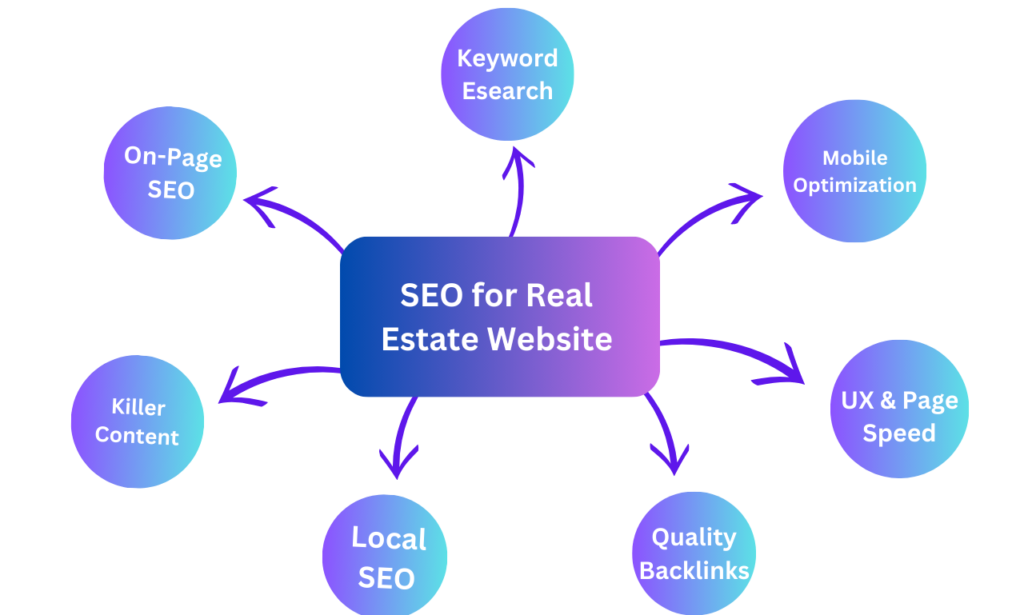Are you a real estate professional looking to skyrocket your online presence and attract more potential clients? If so, buckle up because we’re about to dive into the world of SEO tactics specifically tailored for real estate websites. In this dynamic digital landscape, mastering SEO is no longer just an option – it’s a game-changer that can propel your business to new heights. So grab your favorite beverage, get comfy, and let’s unravel 13 powerful SEO strategies that will revolutionize the way you approach online marketing for your real estate business. Let’s get started!
Here’s you go:
Why SEO Important for Real Estate Business?

When it comes to real estate businesses, having a strong online presence is crucial. In today’s digital age, potential buyers and sellers are turning to search engines like Google to find properties and real estate agents. Understanding how to do SEO for real estate websites is essential to capitalize on this behavior.
SEO plays a vital role in ensuring that your real estate website ranks high on search engine results pages.
By optimizing your site for relevant keywords, you can attract more organic traffic and increase your visibility among potential clients. Knowing how to do SEO for real estate websites can make a significant difference in your online reach.
Effective SEO strategies can help establish credibility and trust with your target audience. When users see your website ranking at the top of search results, they are more likely to perceive your business as reputable and trustworthy.
By learning how to do SEO for real estate websites, you can build a strong online reputation.
Furthermore, by implementing SEO best practices such as keyword research, content optimization, and link building, you can stay ahead of the competition in the highly competitive real estate market. Before we go deeper, here are a few statistics you need to know:
- 46% of all Google searches are seeking
- 50% of home buyers use a mobile website or app to search for homes.
- 53% of all website traffic comes from organic search .
How to Do SEO for Real Estate Website? 7 Game Changing SEO Tatics:

Here’s you go:
- Keyword Research and Targeting
- On-Page Optimization
- Engaging and Relevant Content
- Local Business SEO
- Quality Backlinks
- UX & Page Speed
- Mobile Optimization
1- Keyword Research and Targeting
Keyword research and targeting are crucial for optimizing a real estate website’s visibility on search engines. By identifying the right keywords, you can attract relevant traffic to your site and increase the chances of converting visitors into leads.
Start by brainstorming a list of potential keywords that are related to your real estate niche. Use tools like Google Keyword Planner or SEMrush to discover popular search terms that potential clients may use when looking for properties.
Additionally, incorporating Latent Semantic Indexing (LSI) keywords can further enhance your SEO strategy by providing context and relevance to your content.
Top Keyword Research Tools:
- Google Keyword Planner
- Semrush
- Ahref
- Ubersuggset
- Keyword Tool.io
- Hoth Keyword Planner
- Keysuggest
Focus on long-tail keywords that are more specific and have less competition. For example, instead of targeting “real estate,” consider using phrases like “luxury waterfront homes in Miami” to attract more qualified leads. Include LSI keywords such as “waterfront properties” or “Miami real estate market” to add depth to your content.
How to Select the Right and perfect keyword?:
If you’re beginner and want to know what is the perfect keyword then here’s suggestion for you, always choose the keyword in the beginning that keyword difficulty would be:
- KD: <10
- Search Volume: Less than 300 (if you’re a beginner)
- Intent: Commercial
The reason behind the low search volume is that a lot of marketers and SEOs don’t focus on these due to less search volume. And it’s your chance to rank on the first page and attract qualified leads.
Regularly monitor keyword performance and make adjustments as needed to stay ahead of competitors. Remember, effective keyword research is an ongoing process that requires constant refinement and optimization for maximum impact on your SEO efforts.
2- Optimizing On-Page Content:
Optimizing on-page content is crucial for real estate websites to rank higher in search engine results. Start by conducting keyword research to understand what potential clients are searching for.
Incorporate these keywords naturally into your page titles, meta descriptions, headers, and body content. Using LSI keywords like “property listings,” “home buying tips,” and “real estate market trends” can improve your page’s relevance and searchability.
Tips to Optimize:
- URL Structure Should be Clean
- Relevant Keyword in URL
- Use Alt text in Image
- Create Unique and Valuable Content
- Include your main Keyword in Title,
- Keyword in Description
- Keyword in Tags
- Include Internal Links
Make sure your content is organized logically with clear headings and subheadings. Include internal links to other relevant pages on your website to improve navigation and boost SEO.
Regularly update and refresh your on-page content to show search engines that your website is current and authoritative in the real estate industry.
By optimizing your on-page content effectively, you can increase visibility, attract more organic traffic, and ultimately drive more leads for your real estate business.
3- Listing Optimization:
1. Use Relevant Keywords
- Research Keywords: Identify and incorporate high-value keywords relevant to the property, such as “luxury condo in Chicago” or “3-bedroom house for sale.”
- Keyword Placement: Include these keywords naturally in the title, description, and throughout the listing.
2. Craft Compelling Titles
- Descriptive Titles: Create clear, engaging titles that highlight key features and include primary keywords (e.g., “Stunning 4-Bedroom Home with Pool in Downtown Chicago”).
- Avoid Clickbait: Ensure the title accurately reflects the property to maintain user trust.
3. Write Detailed Descriptions
- Highlight Features: Detail the property’s key features, amenities, and unique selling points.
- Include Location: Mention the neighborhood, nearby amenities, and any location-specific benefits.
4. Optimize Images
- High-Quality Photos: Use high-resolution images that showcase the property effectively.
- Alt Text: Add descriptive alt text to each image, including relevant keywords (e.g., “modern kitchen with stainless steel appliances”).
5. Utilize Property Videos
- Create Virtual Tours: Add video tours or walkthroughs to give potential buyers a better view of the property.
- Optimize Video Titles: Use keywords in video titles and descriptions to improve visibility.
6. Implement Local SEO
- Local Keywords: Include location-specific keywords in the listing (e.g., “homes for sale in Lincoln Park”).
- Google My Business: Ensure your business is listed and optimized for local search queries.
7. Encourage Reviews and Testimonials
- Request Reviews: Ask satisfied clients to leave positive reviews on your website or real estate platforms.
- Showcase Testimonials: Feature client testimonials prominently in your listings to build credibility.
8. Ensure Mobile-Friendliness
- Responsive Design: Optimize your property listings for mobile devices to ensure a seamless user experience.
- Fast Load Times: Improve page load speeds to reduce bounce rates and enhance user engagement.
9. Add Clear Call-to-Actions (CTAs)
- Contact Information: Provide easy access to contact details or a form for inquiries.
- Schedule Showings: Include options for scheduling property viewings or requesting more information.
10. Monitor and Analyze Performance
- Track Metrics: Use tools like Google Analytics to monitor the performance of your property listings.
- Adjust Strategies: Analyze user engagement and adjust keywords, descriptions, and other elements based on performance data.
By implementing these optimization strategies, you can enhance the visibility and appeal of property listings, attract more potential buyers, and improve overall SEO performance.
4- Local Business SEO:

When it comes to real estate websites, local SEO strategies can make a significant impact on visibility and lead generation. By focusing on optimizing your website for local searches, you can target potential clients in specific geographic areas effectively. Understanding how to do SEO for real estate websites is crucial for this process.
One key aspect of local SEO is ensuring that your business information is consistent across all online platforms, including directories and review sites. This helps improve credibility with search engines and potential customers searching for real estate services in their area. Knowing how to do SEO for real estate websites ensures this consistency.
Another important strategy is to create location-specific content tailored to the neighborhoods or cities you serve. This could include market updates, community events, or featured listings that appeal to local audiences. By mastering how to do SEO for real estate websites, you can create highly targeted content.
Incorporating localized keywords into your website content and metadata also plays a crucial role in improving your site’s visibility in local search results. Think about what terms potential clients might use when looking for real estate services in their area and integrate those keywords strategically throughout your website.
By implementing these local SEO strategies effectively, real estate businesses can enhance their online presence and attract more qualified leads from their target market.
5- Building Quality Backlinks:
When we talk about link building, it doesn’t mean creating backlinks on non-reputed, low-quality, and paid sites. Building quality backlinks is a crucial aspect of SEO for real estate websites. Backlinks from reputable and relevant sources signal to search engines that your site is trustworthy and authoritative in the industry. There are different types and ways to create backlinks. Below are types and ways mentioned, some of which are banned by Google:
Types of Backlinks:
- Editorial Backlinks
- Niche Directory Backlinks
- Social Profile Backlinks
- Q&A Backlinks
- Broken Link Building Backlinks
- Sponsored Backlinks
- PBN (Private Blog Network) Backlinks
- Image Subimission
- Blog Comment Backlink
- Forum Post Backlink
- Guest Post Backlinks
Avoid these types of Backlinks:
- Paid Links
- Link Schemes
- Private Blog Networks (PBNs)
- Automated Link Building
- Spammy Blog Comments
- Footer Links
- Forum Spam
- Hidden Links
Gurilla Writing: One effective way to acquire quality backlinks is by creating valuable, shareable content that other websites would want to link back to. This could include informative blog posts, market reports, or interactive tools related to real estate trends.
Influencers Outreach: Another strategy is reaching out to industry influencers or partners for collaboration opportunities that can result in backlinks from their websites. Networking within the real estate community can lead to valuable link-building prospects.
Additionally, guest posting on reputable sites within the real estate niche can help establish your website as an authority while earning quality backlinks in return. This is they of success and millions of traffic. if you want real time and for long term traffic. Also it’s the best source of lead generation.
Remember, it’s not just about quantity but more importantly about the quality of backlinks pointing to your site.
6- UX and Page Speed:

Website speed and user experience play a crucial role in the success of any real estate website. A slow-loading site can turn away potential clients, leading to missed opportunities.
How to Speed up Site?
To improve website speed,
- Optimize images by compressing them without compromising quality.
- Minify CSS and JavaScript files to reduce loading time.
- Use less animations
How to Enhance UX?
To Enhance user experience make sure visitors can easily find what they are looking for with clear menus and search functionality. Additionally, declutter your website by removing unnecessary elements that may distract users from their main purpose. Here’s the few tips:
- Ensure Mobile Responsiveness
- Simplify Navigation
- Enhance Readability
- Improve Accessibility
- Use Engaging Visuals
last but not least “Regularly Test and Gather Feedback”.
Consider utilizing caching techniques to store frequently accessed data, reducing load times for returning visitors. Regularly monitor your site’s performance using tools like Google PageSpeed Insights or GTmetrix to identify areas for improvement.
By prioritizing website speed and enhancing user experience, you can create a seamless browsing experience that keeps visitors engaged and increases the likelihood of conversions on your real estate website.
Stat: 32% of users will abandon a page if it takes longer than 3 seconds to load.
Source: Google (2022)
Implication: Page speed is crucial for retaining users. Slow-loading pages can lead to higher bounce rates, negatively impacting user engagement and overall site effectiveness.
7- Optimize for Mobile Devices:
In today’s digital age, mobile optimization is crucial for real estate websites. With more and more users browsing on their smartphones and tablets, it’s essential to ensure your site is responsive and user-friendly on all devices.
Mobile optimization involves creating a seamless experience for visitors accessing your website from their mobile devices. This includes ensuring fast loading times, easy navigation, and clear call-to-action buttons that are easily clickable on smaller screens.
By optimizing your real estate website for mobile devices, you can improve the overall user experience and increase engagement with potential clients. Additionally, Google prioritizes mobile-friendly websites in its search rankings, so optimizing for mobile can also boost your SEO efforts.
To enhance mobile optimization for your real estate website, consider using a responsive design that automatically adjusts to different screen sizes or creating a separate mobile version of your site tailored specifically for smartphone users. By prioritizing mobile optimization, you can stay ahead in the competitive world of online real estate marketing.
Why it’s important:
Stat: 54.8% of global website traffic comes from mobile devices.
Source: Statista
Implication: With more than half of all web traffic coming from mobile devices, ensuring your website is mobile-friendly is crucial for reaching a significant portion of users.
In Short:

Mastering SEO for real estate websites involves understanding the basics, optimizing on-page content, enhancing user experience, building quality backlinks, and leveraging local SEO. By implementing these strategies, real estate professionals can improve their search engine rankings, attract more leads, and enhance their online presence. Also Here you can see other marketing types from where you can generate leads for your real estate business.
FAQs

1. How long does it take to see results from SEO efforts?
- SEO results can vary, but generally, you may start seeing noticeable improvements in 3 to 6 months. SEO is a long-term strategy, and consistent efforts yield the best results.
2. What tools can help with keyword research for real estate websites?
- Tools like Google Keyword Planner, Ahrefs, SEMrush, and Moz can help identify relevant keywords and analyze search volume, competition, and trends.
3. Is it worth investing in professional SEO services for real estate websites?
- Investing in professional SEO services can be worthwhile if you lack the time or expertise to manage SEO effectively. Professionals can provide tailored strategies, ongoing optimization, and expertise to improve your website’s performance and rankings.
